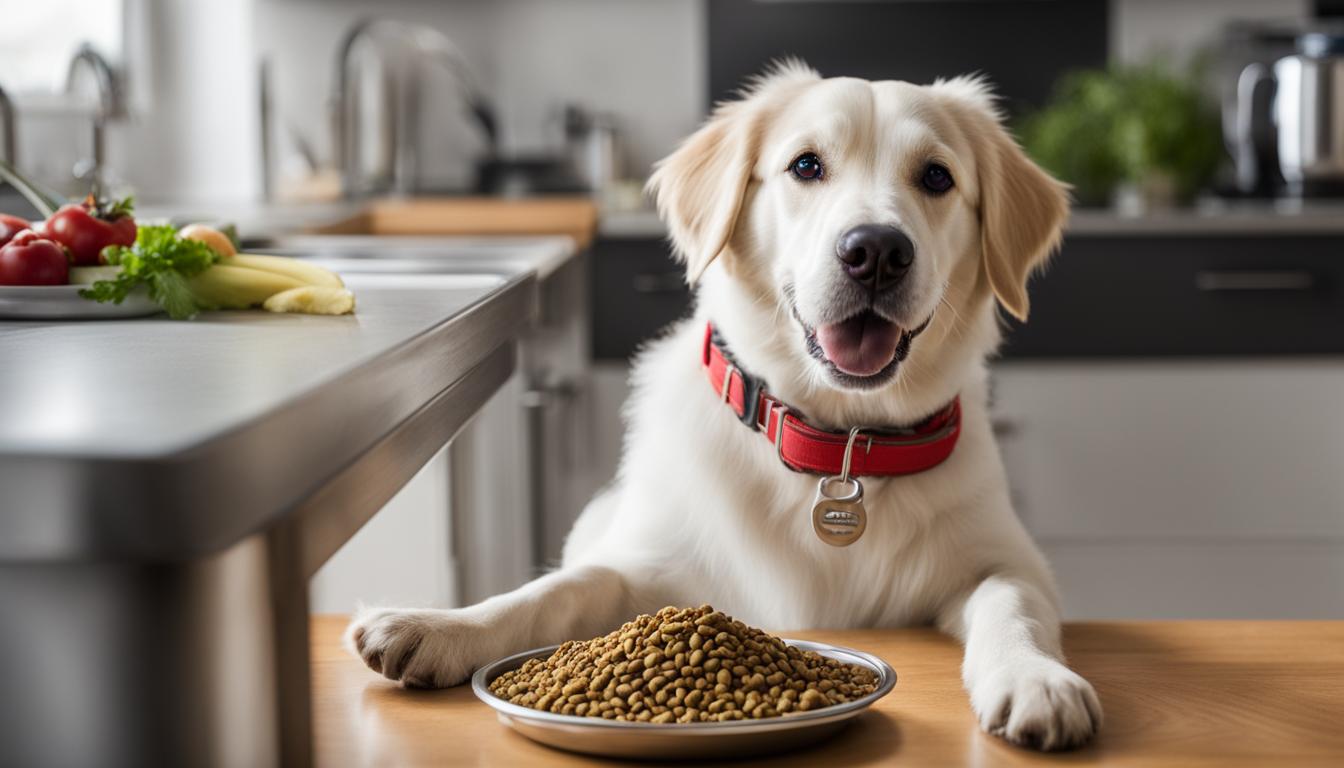Finding the best dog food for picky eaters with sensitive stomach can be a challenge for many pet owners. Once serious health conditions have been ruled out by a veterinarian, an appropriate diet change may help address food allergies or intolerances in your furry friend. This article will discuss top recommended foods that are both nourishing and gentle for your dog’s sensitive stomach. These diets often incorporate raw, fresh, and dry kibble variations focused on high animal protein content, limited ingredients, and specific formulations to support digestive health and cater to the palatability for picky eaters. Discover how a carefully planned diet can lead to improved coat shine, energy levels, and overall health for your pet.

Key Takeaways
- Consult with your veterinarian to rule out serious health conditions before changing your dog’s diet
- Focus on nourishing and gentle dog food options, such as high animal protein content, limited ingredients, and specific formulations to support digestive health
- Keep in mind that raw, fresh, and dry kibble variations may be suitable for your dog’s sensitive stomach and picky eating habits
- Explore popular brands like Hill’s Science Diet, Purina Pro Plan, and Wellness Core Digestive Health for high-quality dog food options
- A successful transition to a new diet may lead to improved coat shine, energy levels, and overall health for your pet
Understanding Your Dog's Sensitive Stomach and Picky Eating Habits
A sensitive stomach in dogs can present as various dog digestive problems, such as vomiting, loose stools, and flatulence. These issues may sometimes necessitate specialized diets to address the underlying causes. To pinpoint whether these digestive problems stem from canine food allergies or food intolerance in dogs, it’s essential to consult with a veterinarian and make an informed decision when selecting suitable dog food.
For dogs with sensitive stomachs, veterinarians often recommend highly digestible proteins, carbohydrates, and fats, as well as prebiotics and probiotics. These ingredients not only help restore and maintain digestive health but also address the picky dog eating habits that may accompany a sensitive stomach.
Proper nutrition can significantly improve the quality of life for dogs with sensitive digestive systems. – Veterinarians and dog parents
Understanding your dog’s unique dietary needs and adjusting their food accordingly can result in noticeable improvements in their overall wellbeing. To ensure that your furry companion receives the nourishment they need while easing their digestive discomfort, consider the following recommendations:
- Consult with a veterinarian to determine if your dog’s digestive issues are due to food allergies or intolerances.
- Select dog food that incorporates highly digestible proteins, carbohydrates, and fats to promote optimal digestive health.
- Pay attention to your dog’s unique dietary preferences, and choose food that caters to their picky eating habits without compromising their health.
- Consider incorporating prebiotics and probiotics to support a healthy gut microbiome for better digestion.
By taking these steps to address your dog’s sensitive stomach and picky eating habits, you can provide tailored nutrition that promotes a happier, healthier pet.
Key Ingredients to Look for in Dog Food for Sensitive Stomachs
When selecting dog food for sensitive stomachs, it is crucial to pay attention to the composition of key ingredients, which include proteins, fats, and carbohydrates. Choosing the right sources of these nutrients can significantly contribute to your dog’s overall digestive health and well-being by providing balanced nutrition and promoting a healthy gut microbiome.
Proteins: Selecting Easily Digestible Sources
Easily digestible proteins are essential in a dog food designed for sensitive stomachs. Sources such as poultry, fish, and egg products can be gentler on your dog’s stomach and more readily absorbed during digestion. Fresh animal proteins provide the necessary amino acids for a balanced diet while minimizing the chances of triggering food intolerances or digestive issues.
“High-quality protein sources are essential for dogs with sensitive stomachs, as it minimizes potential food intolerances.”
Fats: Balancing Quality with Digestibility
Quality fats are crucial for energy production, healthy coat maintenance, and overall well-being, but they must be balanced with digestibility to avoid putting additional strain on your dog’s sensitive digestive system. Opt for dog foods containing named animal fats and oils rich in essential fatty acids, as these sources provide a necessary balance of balanced fats for dogs.
- Chicken fat
- Salmon oil
- Canola oil
Digestible fats in dog food should be supplemented in moderation, ensuring your canine companion receives the necessary nutrients without risking further gastrointestinal discomfort.
Carbohydrates: Identifying Gentle and Nutritious Options
Carbohydrates play a crucial role in providing energy and dietary fiber, but not all sources of carbs are suitable for dogs with sensitive stomachs. Gentle carbohydrates for dogs include sweet potatoes, pumpkin, and easily digestible grains, which offer not only energy but also essential nutrients to support a healthy gut microbiome and improve stool consistency.
- Sweet potatoes
- Pumpkin
- Quinoa
By being mindful of the carbohydrate sources in your dog’s diet and selecting nutritious carbs, you can significantly improve their digestive health and overall well-being.
Top Recommended Dog Foods for Sensitive Stomach and Picky Eaters
Finding the right dog food for your pet with a sensitive stomach and picky eating habits is essential to help them live a healthy and happy life. With so many options available, it can be overwhelming to choose the best one. To assist you in selecting the best food for your canine companion, we have compiled a list of top recommended dog foods that cater to both sensitive stomachs and picky eaters. These products offer premium quality and carefully chosen ingredients to support healthy digestion and appetite while ensuring that your dog’s diet remains both flavorful and enjoyable.
- Hill’s Science Diet Sensitive Stomach & Skin Dry Dog Food – A top choice for pet owners, this premium dry kibble for dogs is formulated to cater specifically to sensitive stomachs. It includes prebiotic fiber for optimal digestive health, high-quality proteins, and nourishing ingredients that promote a healthy coat and skin. Available for various life stages and breed sizes.
- Purina Pro Plan Sensitive Skin & Stomach Dry Dog Food – This product boasts high-quality and easily digestible proteins, such as salmon, with a rich blend of omega fatty acids for a shiny coat and healthy skin. It also includes rice and oatmeal, which are gentle carbohydrates for dogs with sensitive stomachs. Available in formulations for puppies, adult dogs, and seniors.
- Wellness Core Digestive Health Grain-Free Dry Dog Food – As one of the best-canned dog food options, this grain-free choice consists of wholesome ingredients like chicken and turkey to provide a protein-rich meal. Additionally, it includes prebiotics and probiotics to enhance gut health, as well as plenty of antioxidants, vitamins, and minerals for overall wellbeing. Multiple recipe options cater to various life stages, breed sizes, and flavor preferences.
Remember, it is crucial to consult with your veterinarian before changing your dog’s diet, especially if they have a sensitive stomach or picky eating habits.
Each of these top dog foods for picky eaters with sensitive stomachs offers specially tailored recipes that prioritize easily digestible proteins, gentle carbohydrates, and ingredients that promote gut health. By choosing one of these options, you can ensure that your dog receives a diet that not only meets their nutritional needs but also addresses their sensitivities and preferences. In doing so, you will be well on your way to providing your furry companion with a balanced meal that supports their overall health and happiness.
Transitioning Your Picky Eater to a Sensitive Stomach Diet
When transitioning to a sensitive stomach diet for your picky dog, it’s crucial to introduce the new dog food gradually. Abrupt diet changes can further stress your dog’s digestive system and exacerbate existing issues. Taking a phased approach to introducing new dog food reduces the risk of Diarrhea, vomiting, or refusal to eat by giving your dog some time to adjust to the new ingredients.
The Importance of Gradual Diet Changes
A slow, gradual transition is key to avoiding detrimental effects on your dog’s sensitive stomach. Typically, the process should occur over a period of 6 to 10 days, depending on how sensitive your dog’s digestive system is.
“By mixing increasing amounts of the new food with the old food over several days, your dog’s digestive system can gently adjust. This approach minimizes the likelihood of negative responses and ensures a seamless transition.”
To achieve a smooth diet change for your picky dog, follow these steps:
- Days 1-2: Mix 25% of the new food with 75% of the old food.
- Days 3-4: Adjust the ratio to 50% new food and 50% old food.
- Days 5-6: Increase the proportion of the new food to 75%, with 25% of the old food remaining.
- Days 7-10: Complete the process by feeding your dog 100% of the new food.
During this transition, pay close attention to your dog’s response to the new diet. If your dog experiences any adverse reactions, such as digestive upset or food refusal, pause the process and consult with your veterinarian for guidance.Introducing new dog food for picky eaters with sensitive stomachs can be a delicate process. By taking a gradual approach and remaining attentive to your dog’s needs, you can successfully transition to a healthier, more suitable diet to support your dog’s overall well-being.
Benefits of Homemade Dog Food
There are many benefits of feeding your dog homemade food.
One benefit is that you know exactly what ingredients are in the food, and can avoid any potential allergens or other ingredients that may not be good for your dog. You can also tailor the food to your dog’s specific needs, such as if they have allergies or need a special diet.
Homemade dog food is also generally much cheaper than commercial dog food, and can even save you money on vet bills in the long run. Studies have shown that dogs who eat homemade food have fewer health problems and live longer than those who eat commercial dog food.
Another benefit of homemade dog food is that it is usually much fresher and tastier than commercial food. This is because commercial dog food often contains preservatives and other additives that can make it less healthy and less palatable for your dog. When you make your own food, you can be sure that your dog is getting the best possible nutrition.
There are many different recipes available for homemade dog food, so you can find one that is perfect for your dog’s individual needs. You can also make large batches of food and freeze it, so you always have some on hand.
Overall, feeding your dog homemade food has many benefits that can help your dog live a longer, healthier life. Not only is it better for their health, but it can also save you money in the long run. It’s also a great way to make sure your dog is getting the best possible nutrition.
Pros & Cons of Different Dog Food Brands
There are a lot of options when it comes to dog food brands. It can be overwhelming to try to decide which one is best for your dog. Here are some pros and cons of different dog food brands to help you make a decision.
Pros:
- Nutro is a good brand for dogs with allergies. They have a limited ingredient diet that is easy on the stomach.
- Blue Buffalo is a good brand for all life stages. They have a variety of formulas for puppies, adults, and seniors.
- Iams is a good brand for active dogs. Their formulas have high levels of protein and fat to help keep your dog energetic.
Cons:
- Nutro can be expensive.
- Blue Buffalo has been known to cause stomach issues in some dogs.
- Iams has been known to cause skin problems in some dogs.
Conclusion: Choosing the Right Food for Your Furry Companion
Consulting with a veterinarian is crucial for identifying the root causes of your dog’s sensitive stomach and picky eating tendencies. This professional guidance will help you select a suitable pet nutrition plan tailored to your furry friend’s needs. As you navigate the world of pet food options, consider brands like Hill’s Science Diet, Purina Pro Plan, and Wellness Core Digestive Health, which are renowned for providing quality formulations designed for sensitive digestion and accommodating picky eaters.
Finally, bear in mind that transitioning your dog to a new diet should be a gradual process to prevent further digestive upset. Observing a slow and steady approach allows time for your pet’s digestive system to adapt to new ingredients, minimizing the risk of adverse reactions or refusal to eat. Through diligent research, careful diet adjustments, and seeking veterinarian advice, you’ll be well-equipped to address your dog’s sensitive digestion needs and ensure their overall health and happiness.
Frequently Asked Questions (FAQs)
What are some signs of a sensitive stomach in dogs?
Signs of a sensitive stomach in dogs include vomiting, loose stools, flatulence, and changes in appetite. If these symptoms persist, it is important to consult with a veterinarian to determine the cause and appropriate treatment.
Which dog food brands are recommended for picky eaters with sensitive stomachs?
Some top recommended dog food brands for picky eaters with sensitive stomachs include Hill’s Science Diet, Purina Pro Plan, and Wellness Core Digestive Health. These brands offer specific formulations such as grain-free options, life-stage recipes, and added prebiotics and probiotics to support sensitive digestion.
What is the best way to introduce a new food to a picky eater with a sensitive stomach?
Gradual diet changes are essential for introducing new food to a picky eater with a sensitive stomach. Mix increasing amounts of the new food with the old food over several days and monitor the dog’s response to the change. This will allow their digestive system to adjust to the new ingredients without upsetting their stomach.
How can pet owner testimonials and reviews help in choosing the right dog food?
Testimonials and reviews from real pet owners provide valuable insights into the effectiveness of specific dog foods for sensitive stomachs and picky eaters. Reading about the experiences of others who have successfully addressed similar issues with their pets can help you make a more informed decision when choosing the best dog food for your pet.

